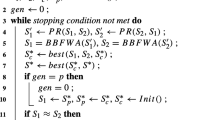Abstract
This paper proposes a multi-objective constrained minimum weighted bipartite assignment problem (MCMWBAP), which is considered an extension of the classical bipartite matching problem (BMP). We first provide the formulation of the MCMWBAP and prove that it is an NP-hard combinatorial optimization problem. Based on this formulation, multi-objective energy-aware shortwave radio broadcast resource allocation problem (MSRBRAP) application is studied. The goal of this problem is to allocate radio programs to transmission devices to broadcast all radio programs felicitously with a maximized objective of total qualified monitoring sites and a minimized objective of energy consumption. Then, a novel multi-objective hybrid evolutionary algorithm (MOHEA), which is integrated with push and pull initialization, the dynamic resource allocation strategy, and the aggregate local search procedure, is developed to solve the problem. The proposed method is evaluated using two categories of benchmarks for MCMWBAP together with a real scenario case study for MSRBRAP. Furthermore, the key components of MOHEA are analyzed, and the experimental results demonstrate that MOHEA outperforms two classical multi-objective evolutionary algorithms (NSGA-II and MOEA/D), improving working efficiency.
Similar content being viewed by others
References
Ma F, Gao X, Yin M, et al. Optimizing shortwave radio broadcast resource allocation via pseudo-boolean constraint solving and local search. In: Proceedings of International Conference on Principles and Practice of Constraint Programming, 2016. 650–665
Kuhn H W. The Hungarian method for the assignment problem. Naval Res Logistics, 1955, 2: 83–97
Munkres J. Algorithms for the assignment and transportation problems. J Soc Industrial Appl Math, 1957, 5: 32–38
Belongie S, Malik J, Puzicha J. Shape matching and object recognition using shape contexts. IEEE Trans Pattern Anal Machine Intell, 2002, 24: 509–522
Huang C Y, Chen Y S, Lin Y L, et al. Data path allocation based on bipartite weighted matching. In: Proceedings of the 27th ACM/IEEE Design Automation Conference, 1991. 499–504
Reiffenhäuser R. An optimal truthful mechanism for the online weighted bipartite matching problem. In: Proceedings of the 30th Annual ACM-SIAM Symposium on Discrete Algorithms, 2019. 1982–1993
Chen C, Chester S, Srinivasan V, et al. Group-aware weighted bipartite b-matching. In: Proceedings of the 25th ACM International on Conference on Information and Knowledge Management, 2016. 459–468
McCrae J, Arcan M, Ahmadi S. Lexical sense alignment using weighted bipartite b-matching. In: Proceedings of the 2nd Conference on Language, Data and Knowledge (LDK 2019), 2019
Pan L, Jin J, Gao X, et al. Integrating ILP and SMT for shortwave radio broadcast resource allocation and frequency assignment. In: Proceedings of International Conference on Principles and Practice of Constraint Programming, 2017. 405–413
Wang S J, Wu T Y, Yao Y, et al. Constrained maximum weighted bipartite matching: a novel approach to radio broadcast scheduling. Sci China Inf Sci, 2019, 62: 072102
Long J, Sun Z, Pardalos P M, et al. A hybrid multi-objective genetic local search algorithm for the prize-collecting vehicle routing problem. Inf Sci, 2019, 478: 40–61
Salcedo-Sanz S, Bousono-Calzon C, Figueiras-Vidal A R. A mixed neural-genetic algorithm for the broadcast scheduling problem. IEEE Trans Wirel Commun, 2003, 2: 277–283
Arivudainambi D, Rekha D. An evolutionary algorithm for broadcast scheduling in wireless multihop networks. Wireless Netw, 2012, 18: 787–798
Neri F, Cotta C. Memetic algorithms and memetic computing optimization: a literature review. Swarm Evolary Comput, 2012, 2: 1–14
Deb K, Pratap A, Agarwal S, et al. A fast and elitist multiobjective genetic algorithm: NSGA-II. IEEE Trans Evol Computat, 2002, 6: 182–197
Zhang Q F, Li H. MOEA/D: a multiobjective evolutionary algorithm based on decomposition. IEEE Trans Evol Computat, 2007, 11: 712–731
Cai X Y, Li Y X, Fan Z, et al. An external archive guided multiobjective evolutionary algorithm based on decomposition for combinatorial optimization. IEEE Trans Evol Computat, 2015, 19: 508–523
Fan Z, Li W, Cai X, et al. Push and pull search for solving constrained multi-objective optimization problems. Swarm Evolary Comput, 2019, 44: 665–679
Ishibuchi H, Murata T. A multi-objective genetic local search algorithm and its application to flowshop scheduling. IEEE Trans Syst Man Cybern C, 1998, 28: 392–403
Author information
Authors and Affiliations
Corresponding authors
Rights and permissions
About this article
Cite this article
Zhou, Y., Fan, M., Ma, F. et al. Solving multi-objective constrained minimum weighted bipartite assignment problem: a case study on energy-aware radio broadcast scheduling. Sci. China Inf. Sci. 65, 182101 (2022). https://doi.org/10.1007/s11432-019-3017-9
Received:
Revised:
Accepted:
Published:
DOI: https://doi.org/10.1007/s11432-019-3017-9




